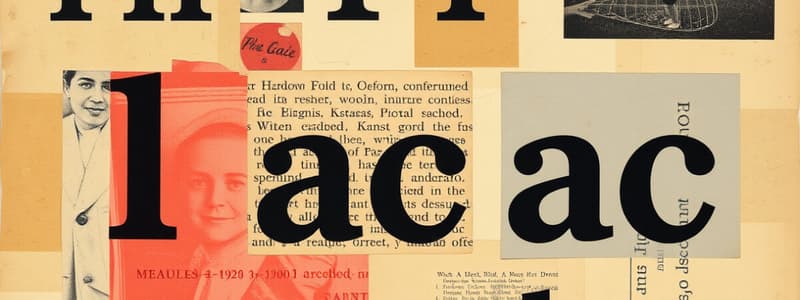Podcast
Questions and Answers
Match the following IPA symbols with their corresponding sounds:
Match the following IPA symbols with their corresponding sounds:
[i] = sounds like 'ee' (as in 'see') [u] = sounds like 'oo' (as in 'food') [ɑ] = sounds like 'ah' (as in 'spa') [ʌ] = sounds like 'uh' (as in 'cup')
Match the following IPA symbols with their vowel categories:
Match the following IPA symbols with their vowel categories:
[ɪ] = near-high front unrounded vowel [ɔ] = low-mid back rounded vowel [æ] = low front unrounded vowel [ə] = mid-central unrounded vowel (schwa)
Match the following sounds with their IPA symbols:
Match the following sounds with their IPA symbols:
'ih' (as in 'sit') = [ɪ] 'eh' (as in 'bet') = [ɛ] 'aw' (as in 'thought') = [ɔ] 'uh' (as in 'sofa') = [ə]
Match the following sounds with their examples:
Match the following sounds with their examples:
Match the following IPA symbols with their front/back classification:
Match the following IPA symbols with their front/back classification:
Match the following sounds with their IPA symbols:
Match the following sounds with their IPA symbols:
Match the following sounds with their IPA symbols:
Match the following sounds with their IPA symbols:
Match the following sounds with their IPA symbols:
Match the following sounds with their IPA symbols:
Match the following sounds with their IPA symbols:
Match the following sounds with their IPA symbols:
Match the following sounds with their IPA symbols:
Match the following sounds with their IPA symbols:
Match the following sounds with their IPA symbols:
Match the following sounds with their IPA symbols:
Match the following sounds with their type:
Match the following sounds with their type:
Match the following sounds with their type:
Match the following sounds with their type:
Flashcards
/p/
/p/
Voiceless bilabial plosive, like 'puh'.
/b/
/b/
Voiced bilabial plosive, like 'buh'.
/t/
/t/
Voiceless alveolar plosive, like 'tuh'.
/d/
/d/
Signup and view all the flashcards
/k/
/k/
Signup and view all the flashcards
/g/
/g/
Signup and view all the flashcards
/f/
/f/
Signup and view all the flashcards
/v/
/v/
Signup and view all the flashcards
/θ/
/θ/
Signup and view all the flashcards
/ð/
/ð/
Signup and view all the flashcards
/i/
/i/
Signup and view all the flashcards
/æ/
/æ/
Signup and view all the flashcards
/ə/
/ə/
Signup and view all the flashcards
Study Notes
Consonant Sounds in IPA
- /p/: Voiceless bilabial plosive; sounds like "puh" (as in "pat").
- /b/: Voiced bilabial plosive; sounds like "buh" (as in "bat").
- /t/: Voiceless alveolar plosive; sounds like "tuh" (as in "top").
- /d/: Voiced alveolar plosive; sounds like "duh" (as in "dog").
- /k/: Voiceless velar plosive; sounds like "kuh" (as in "cat").
- /g/: Voiced velar plosive; sounds like "guh" (as in "go").
- /f/: Voiceless labiodental fricative; sounds like "fuh" (as in "fun").
- /v/: Voiced labiodental fricative; sounds like "vuh" (as in "van").
- /θ/: Voiceless dental fricative; sounds like "th" (as in "thin").
- /ð/: Voiced dental fricative; sounds like "th" (as in "this").
- /s/: Voiceless alveolar fricative; sounds like "sss" (as in "sit").
- /z/: Voiced alveolar fricative; sounds like "zzz" (as in "zoo").
- /ʃ/: Voiceless post-alveolar fricative; sounds like "sh" (as in "ship").
- /ʒ/: Voiced post-alveolar fricative; sounds like "zh" (as in "measure").
- /h/: Voiceless glottal fricative; sounds like "huh" (as in "hat").
- /m/: Voiced bilabial nasal; sounds like "mmm" (as in "man").
- /n/: Voiced alveolar nasal; sounds like "nnn" (as in "no").
- /ŋ/: Voiced velar nasal; sounds like "ng" (as in "sing").
- /l/: Voiced alveolar lateral approximant; sounds like "luh" (as in "let").
- /r/: Voiced alveolar approximant; sounds like "ruh" (as in "red").
- /j/: Voiced palatal approximant; sounds like "yuh" (as in "yes").
- /w/: Voiced labio-velar approximant; sounds like "wuh" (as in "wet").
Vowel Sounds in IPA
- /i/: High front unrounded vowel; sounds like "ee" (as in "see").
- /ɪ/: Near-high front unrounded vowel; sounds like "ih" (as in "sit").
- /e/: Mid front unrounded vowel; sounds like "eh" (as in "bed").
- /æ/: Low front unrounded vowel; sounds like "a" (as in "cat").
- /a/: Low front unrounded vowel; sounds like "ah" (as in "father").
- /u/: High back rounded vowel; sounds like "oo" (as in "food").
- /ʊ/: Near-high back rounded vowel; sounds like "uh" (as in "book").
- /o/: Mid back rounded vowel; sounds like "oh" (as in "go").
- /ɔ/: Low-mid back rounded vowel; sounds like "aw" (as in "thought").
- /ə/: Mid-central unrounded vowel (schwa); sounds like "uh" (as in "sofa").
- /ɛ/: Mid-front unrounded vowel; sounds like "eh" (as in "bet").
- /ɑ/: Low back unrounded vowel; sounds like "ah" (as in "spa").
- /ʌ/: Mid-central unrounded vowel; sounds like "uh" (as in "cup").
Studying That Suits You
Use AI to generate personalized quizzes and flashcards to suit your learning preferences.




